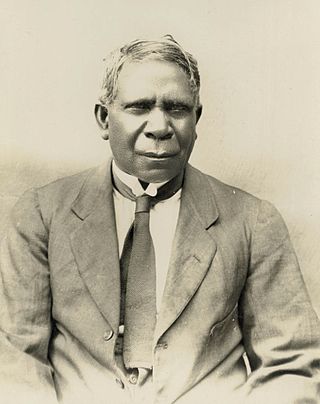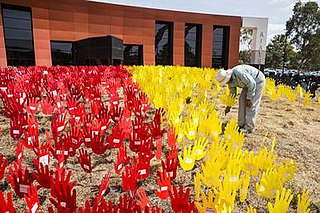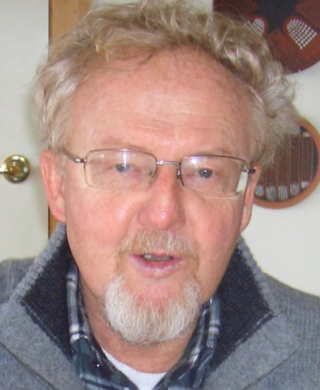
Yagan was an Aboriginal Australian warrior from the Noongar people. Yagan was pursued by the local authorities after he killed Erin Entwhistle, a servant of farmer Archibald Butler. It was an act of retaliation after Thomas Smedley, another of Butler's servants, shot at a group of Noongar people stealing potatoes and fowls, killing one of them. The government offered a bounty for Yagan's capture, dead or alive, and a young settler, William Keats, shot and killed him. He is considered a legendary figure by the Noongar.

David Ngunaitponi, known as David Unaipon, was an Aboriginal Australian preacher, inventor, and author. A Ngarrindjeri man, his contribution to Australian society helped to break many stereotypes of Aboriginal people, and he is featured on the Australian $50 note in commemoration of his work. He was the son of preacher and writer James Unaipon.

Découvertes Gallimard is an editorial collection of illustrated monographic books published by the Éditions Gallimard in pocket format. The books are concise introductions to particular subjects, written by experts and intended for a general audience.

The Australian Institute of Aboriginal and Torres Strait Islander Studies (AIATSIS), established as the Australian Institute of Aboriginal Studies (AIAS) in 1964, is an independent Australian Government statutory authority. It is a collecting, publishing, and research institute and is considered to be Australia's premier resource for information about the cultures and societies of Aboriginal and Torres Strait Islander peoples.

The history of Indigenous Australians began 50,000 to 65,000 years ago when humans first populated the Australian continental landmasses. This article covers the history of Aboriginal Australian and Torres Strait Islander peoples, two broadly defined groups which each include other sub-groups defined by language and culture. Human habitation of the Australian continent began with the migration of the ancestors of today's Aboriginal Australians by land bridges and short sea crossings from what is now Southeast Asia. The Aboriginal people spread throughout the continent, adapting to diverse environments and climate change to develop one of the oldest continuous cultures on Earth.

William Ramsay Smith, frequently referred to as Ramsay Smith, was a Scottish physician, educator, naturalist, anthropologist and civil servant, who worked in South Australia after moving there at the age of about 37 in 1896. He was initially appointed as a pathologist at the Royal Adelaide Hospital and was later appointed to other roles, including that of city coroner in Adelaide, but his legacy has been marred by allegations of misuse of human remains. He made a study of Aboriginal Australians, and sent body parts to Edinburgh University's anthropological collection. He published a number of books and articles in scientific journals, and in 1930 published a work under his own name which was later found to be the work of Ngarrindjeri Elder David Unaipon.
The Fellowship of Australian Writers (FAW) is a collection or federation of state-based organizations aiming to support and promote the interests of Australian writers. It was established in Sydney in 1928, with the aim of bringing writers together and promoting their interests. The organisation played a key role in the establishment of the Australian Society of Authors in 1963, a national body and now the main professional organisation in Australia for writers of literary works.
This is a timeline of Aboriginal history of Western Australia.
Colin Thomas Johnson, better known by his nom de plume Mudrooroo, was an Australian novelist, poet, essayist and playwright. His many works are centred on Aboriginal Australian characters and topics; however, there was some doubt cast upon his claims to have Aboriginal ancestry.
Clarence Frederick "Clarrie" Isaacs, also known as Yaluritja and Ishak Mohamad Haj, was an Aboriginal Australian activist.
Donald Robert Stuart was an Australian novelist whose works include stories with Aboriginal backgrounds, and a series recounting his experience as a prisoner of war in Burma in World War II.
Francis Fraser Armstrong was a Scottish Methodist pioneer of the Swan River Colony who befriended and recorded the language of the Nyungar people in Western Australia. His father Adam Armstrong, was a well known early settler of Western Australia.
Paddy Roe, also known as Lulu was an Aboriginal Elder of the Goolarabooloo tribe of the Nyigina ethnic group in Australia. He was an author who won the Western Australian Week Literary Award in 1985, and was short-listed for the National Book Council Award in 1983, and the New South Wales Premier's Literary Award in 1985. He was awarded the Medal of the Order of Australia in the 1990 Australia Day Honours for "service to Aboriginal welfare". He has collaborated on works such as Gularabulu, Stories from the West Kimberley and others.
Professor Jon Charles Altman is a social scientist with a disciplinary focus on anthropology and economics. He is an emeritus professor of the Australian National University currently affiliated to the Regulatory Institutions Network (RegNet), College of Asia and the Pacific, ANU. He was the founding director of the Centre for Aboriginal Economic Policy Research (CAEPR) at the Australian National University and then a research professor there until 2014 when he retired. He is a Fellow of the Academy of the Social Sciences in Australia and an Honorary Fellow of the Royal Society of New Zealand. From 2008 to 2013 he was an Australian Research Council Australian Professorial Fellow. In late 2015 Altman moved to Melbourne to take up an appointment from 1 February 2016 as research professor at the Alfred Deakin Institute for Citizenship and Globalization at Deakin University.

Indigenous Australian literature is the fiction, plays, poems, essays and other works authored by Aboriginal and Torres Strait Islander people of Australia.
Roebuck Plains Station is a pastoral lease that is located close to the township of Broome in the Kimberley region of Western Australia. It is one of the closest pastoral leases to Broome.
Adam Maximilian Shoemaker is a Canadian-Australian academic and higher education administrator, and a scholarly authority within the field of Indigenous Australian literature. He currently serves as Vice-Chancellor of Victoria University.
Sylvia Kanytjupai Ken is an Aboriginal Australian Artist. Her painting Seven Sisters won the 2019 Wynne Prize awarded by the Art Gallery of New South Wales.

Erich Kolig is an Austrian–New Zealand cultural and social anthropologist whose research has focussed on Muslim and Islamic social and religious issues, and Australian Aboriginal culture. He has written and edited 13 books, as well as publishing many scientific papers and book chapters.






